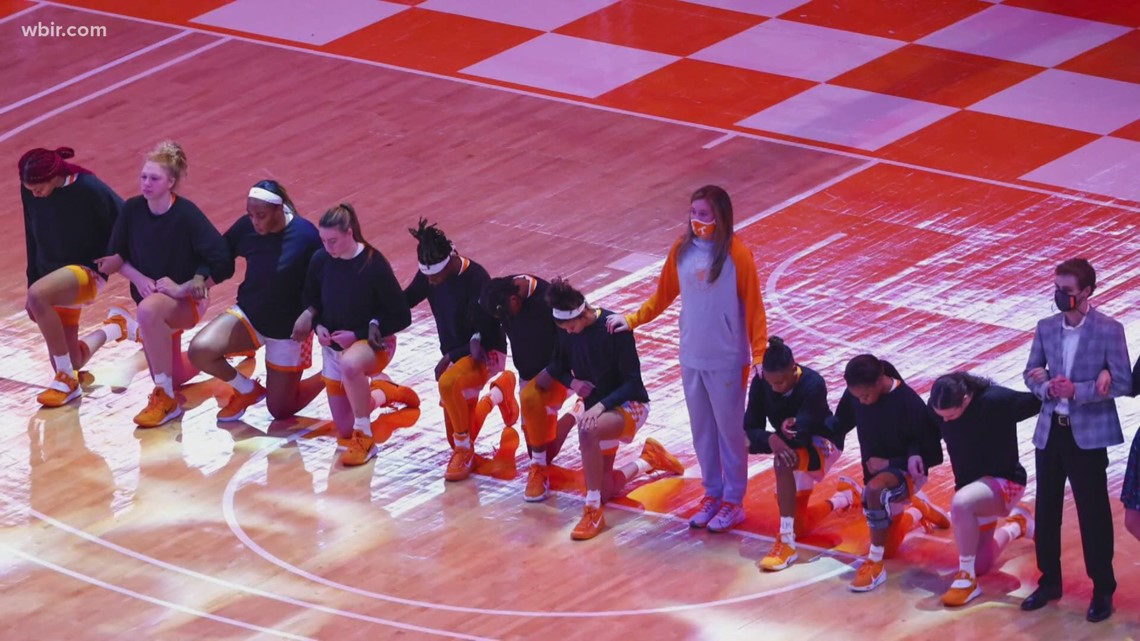BREAKING: University of Texas Cancels Scholarships for Students Who Knelt During National Anthem — A Controversial Decision That Has Sparked Nationwide Debate
In a bold and controversial move that has set off an uproar across the nation, the University of Texas has announced the cancellation of scholarships for two students who chose to kneel during the national anthem at a recent sporting event. The university’s decision has ignited a fierce debate over free speech, civil rights, and patriotism — with critics accusing the institution of stifling protest while supporters argue that the students’ actions were disrespectful to the country and its values.

The incident took place during a high-profile football game, where the two students, both active members of the university’s student body, decided to kneel as a form of protest against social injustices and racial inequality. This gesture, popularized by athletes like Colin Kaepernick, has become a symbol of the broader movement advocating for civil rights and racial justice in the United States. However, it has also been met with significant controversy, particularly regarding its use during the national anthem — a moment that many see as a time for unity and respect.
The University’s Rationale: Disrespecting National Values
In the wake of the protest, the University of Texas administration moved quickly to address the situation, announcing that the students’ scholarships would be revoked due to their actions. University officials stated that their decision was made out of respect for the national anthem and what it represents to the nation.
“The national anthem is a time-honored tradition that should be honored and respected,” said a university spokesperson. “These students are on this land, and they must respect this land. While we support the right to protest, there are appropriate ways to express dissent without undermining the values that unite us as a nation.”
The university’s decision to cancel the scholarships is rooted in a belief that public protest during the national anthem goes against the values of respect, unity, and patriotism that are held dear by many Americans. By taking such swift action, the university has made it clear that it views this act of kneeling as a disruption of national unity.

The Response: Support and Backlash
The university’s decision has sparked a heated debate that has reached far beyond Texas. Supporters of the move argue that the students’ protest was an inappropriate and disrespectful act, particularly in a moment that is meant to honor the sacrifices made by military personnel and others who have fought for the country.
“The national anthem is sacred,” said one supporter. “It’s a time to honor those who have fought and died for this country. Kneeling during the anthem is disrespectful, and I believe the university was right to take action.”
However, the decision has been met with sharp criticism from others who view it as an attack on free speech and an infringement on the students’ right to protest. Critics argue that the university’s move is a form of punishment for the students’ decision to exercise their First Amendment rights, and that it sends a dangerous message about the limits of protest in the modern era.
“This is an outright attack on free speech,” said one faculty member. “These students have every right to express their opinions, and for the university to punish them in this way is a violation of their constitutional rights.”
The Broader Debate: Patriotism, Protest, and Free Speech
The controversy surrounding the University of Texas’ decision raises important questions about the role of protest in a society that values freedom of expression. Kneeling during the national anthem has become a flashpoint for discussions about racial injustice, police brutality, and inequality in America. While many see it as a peaceful form of protest, others view it as a disrespectful challenge to the nation’s traditions and values.
In the past, athletes and public figures have faced criticism and backlash for participating in similar protests, yet the actions of these students at the University of Texas have taken the issue to a new level. The revocation of scholarships serves as a powerful reminder of the real-world consequences of protesting in a highly public setting, particularly when it challenges long-standing norms.

On one side of the debate, some argue that the university had every right to defend its values by imposing consequences for actions that they believed were disruptive and disrespectful to the country. On the other side, others contend that the right to protest is fundamental to the American spirit and that students should be allowed to express dissent, even in controversial forms, without fear of retribution.
What’s Next for the Students and the University?
The revocation of the scholarships has left many wondering what the next steps will be for the two students involved. Both have received widespread support from activists, fellow students, and social justice organizations, who are rallying behind them and demanding that their scholarships be reinstated.
For the University of Texas, the decision to revoke the scholarships may have far-reaching consequences. The controversy has already sparked intense discussion about how universities balance their responsibilities to uphold tradition and respect for country, while simultaneously fostering a culture of free speech and political engagement.
As the debate continues to unfold, one thing is clear: this incident has sparked a national conversation about the boundaries of protest, patriotism, and free speech in America — one that may continue to evolve in the coming months and years.
#UniversityOfTexas #FreeSpeech #NationalAnthemProtest #ScholarshipRevocation #CivilRights #SocialJustice #PatriotismAndProtest